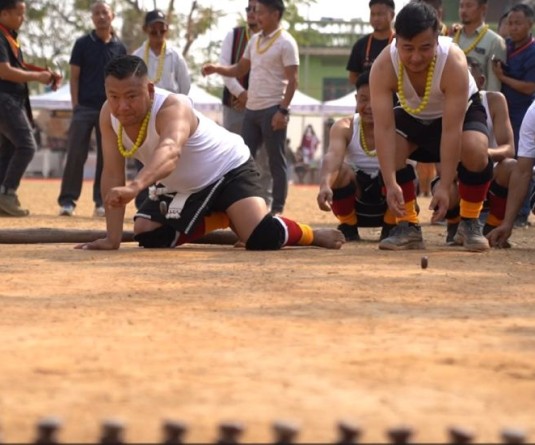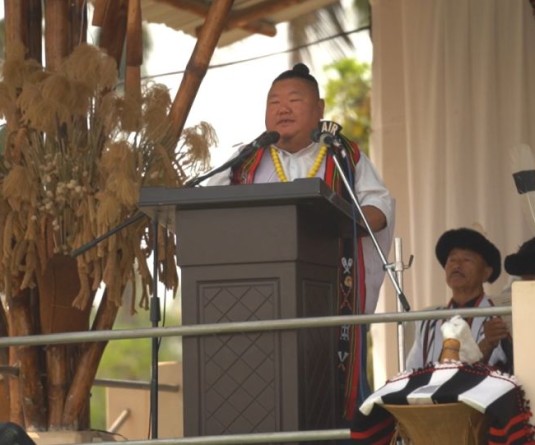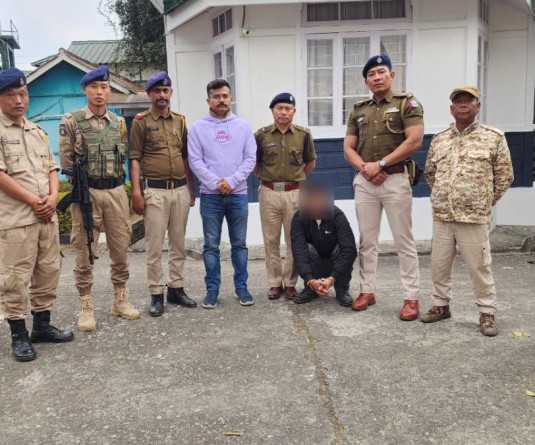
Thannganing Hungyo
Shillong | June 12
NAGA ELDER and think-tank Niketu Iralu, Angami Zapu Phizo’s nephew and Naga National Council supremo Adinno’s first cousin, today publicly tendered an apology to the Tangkhul on behalf of others of his kin, for having dubbed the tribe as “non-entities” in the past. “It is not nice to call somebody a non-entity,” he told a seminar in Shillong.
Clearly, the social worker, who was Isak Swu’s classmate (and bench-mate!), was putting across his point that Nagas have to begin a reflective struggle in the quest for their rights. As a resource person at the seminar organized by the Tangkhul Elders’ Forum, Shillong, the septuagenarian expounded on the need for people-to-people contact between Naga peoples, “our neighbours”, and Indian society.
“Nagas should speak to the hearts and minds of India and not just to politicians,” he asserted, armed with the knowledge that politicians hand over memoranda submitted to them by Nagas to junior bureaucrats not higher in rank than deputy secretaries, who in turn, for future reference, tuck the papers away in a small office designated for the Northeast at the Home Ministry.
He was speaking of the crucial need for ‘Track Two Diplomacy’ which harps on natural, moral justice with sustainable historical rights that “will be listened to by neighbours.” Nagas are not secessionists or anti-Indian hostiles and troublemakers as often portrayed, he said.
But the menace that lies within has to be sorted out as the present scenario depicts a situation that is destroying the struggle itself and with it its people, he analyzed. “Alas! We have learnt to tolerate the stick but become addicted to the carrot.”
The other speaker, an erudite Bengali scholar with the name tag of Dr. Prasenjit Biswas, an associate professor of philosophy at the North Eastern Hill University, Shillong, had some insights and suggestions to offer. Toeing Iralu’s line, he said the sense of “otherness” has to be shared with people of the region who view Delhi as “corrosive in nature.” Referring to the United Nations Declaration on the Rights of Indigenous Peoples passed in 2007, he argued, “The Naga claim over Naga inhabited areas cannot be construed as ‘disputable’ just because it falls within some already existing states. The crucial debate that went on in the UN had been about the ‘right of the third party’ on indigenous land and on different kinds of ownership that can be vested on indigenous resources.”
Delhi should proceed in setting up a legal commission with wide representations from various parties to resolve the matter in the interest of making unification of Naga indigenous peoples possible, he said. “The articles 2 and 3 of the Indian Constitution that allow the central government to alter the boundary of any state in the national interest need to be made operational by removing apprehension of loss from the minds of competing third parties.”
Observing that “dubious” propaganda against the Naga struggle is blowing over, as evident in the mainstream media, he advised that a counter propaganda based on truth needs to be flashed out. “The past should not overshadow the current scenario.” He questioned as to why there was no implementation to the acceptance made by the Cabinet Committee on Security (India’s largest decision-making body), recognizing the right to Naga unification.
Biswas sees the ‘statelessness’ of Nagas in Burma as an opportunity to highlight to the international community the “common feeling of belonging to the Naga identity” by working out a consultative strategy. He also determined the need for a “cohesive ideological framework to formulate Naga politics” between differing groups.
The professor strongly felt that political, economic and cultural rights of the Nagas should be articulated in a constitutional sense. While talking about historical rights it is important to create new political discourse to legitimize the Naga issue, he said. The alternative discourse could incorporate the idea of social imagery, in the sense of cultural “nationalism.”
So how do the Nagas politically translate these ideas? By creating a situation for India to be compelled to take up the unification issue through formation of public opinion, according to Biswas. This can be achieved through protests, meetings and intense campaigns.






